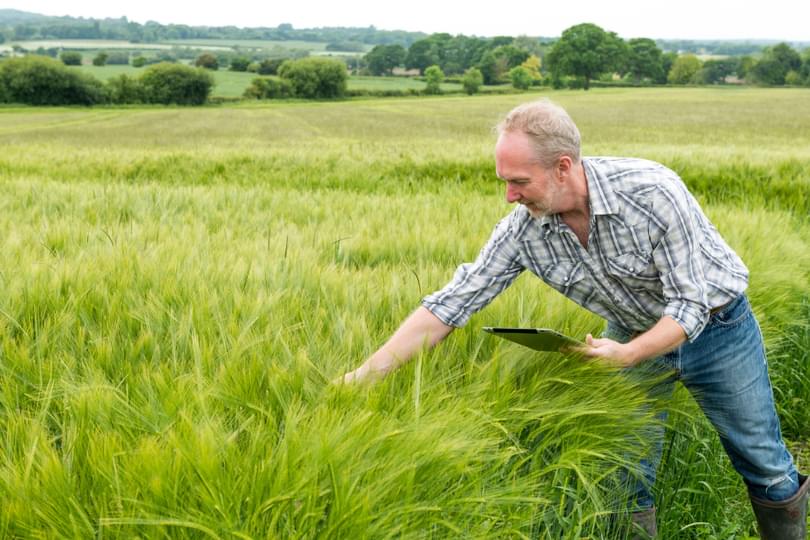
There is an urgent need to substantially reduce the environmental impacts of the global agricultural system while ensuring sufficient food for an estimated population of 10 billion by 2050.
Agriculture is the single biggest driver of biodiversity loss, deforestation, water scarcity, pesticide toxicity and pollution. It is also a major contributor to climate change. However, most farmers are not yet in a position to be able to measure their environmental impacts or monitor drivers of long-term productivity such as soil loss or soil organic carbon.
Measurement is essential to reducing these environmental impacts and tailoring solutions to the farm level. Currently, most farmers seeking help on sustainability and productivity must rely on in-person advice which is often costly and hard to scale. Digital tools do exist to help farmers manage their farms at a larger scale, but each tool functions differently and few include a sustainability dimension.
Most farmers are not yet in a position to be able to measure their environmental impacts
Acknowledging this set of challenges, the HESTIA Farm Sustainability Toolkit (HESTIA FST) Project seeks to investigate the potential of enhancing existing digital tools for farmers, by adding standardised means of measuring, reporting and benchmarking environmental impacts.
HESTIA
The foundation of this project is the HESTIA platform. Currently, agricultural data are not standardised. This means data are stored in different formats, with different fields, definitions of those fields, different units, and different levels of validation. Not only does this make comparisons and knowledge exchange difficult, but it also leaves the food system vulnerable to green washing without a standardised means of assessing environmental performance.
HESTIA – Harmonised Environmental Storage and Tracking of the Impacts of Agriculture – aims to address this by using models to standardise data input from various studies and present it in a structured format. The platform is open access, and freely provides environmental impact calculations performed using models developed by the team to any interested party. It also allows people to upload their own research data to the platform, with the aim that in the long run HESTIA will become the accepted global repository for research on the environmental impacts of agriculture.
Our team is continually developing the HESTIA platform, expanding our glossary and improving the API (Application Programming Interface) which allows the HESTIA platform to communicate with other applications (e.g., existing digital farm tools). The more flexible the API can become, the wider the impact HESTIA can have, as its capacity to integrate with other farm management apps expands.
The Farm Sustainability Toolkit
The purpose of the Farm Sustainability Toolkit project (HESTIA FST) is to learn about how to deploy the HESTIA platform so that it may empower farmers to monitor, report and reduce their environmental impacts, with the aim of understanding its potential to create change at scale.
Social comparison can be a powerful incentive for change
We are engaged in field trials of tools developed using the HESTIA FST in the UK and East Africa, with a focus on wheat and maize respectively. New partnerships across the food system also raise the potential of expanding the trials into other areas such as aquaculture. In these trials, farmers will be given the opportunity to calculate and monitor their environmental impact, compare it to other farmers via benchmarking, and learn how to reduce their impact through an advice engine.
The HESTIA FST is designed to integrate with existing digital farm and business management tools to run full-life cycle calculations of environmental impact. Alternatively, in the absence of an existing tool, a standalone application can be developed to provide the farmer interface. This will allow farmers to estimate their environmental impacts across a range of different indicators, including GHG emissions, eutrophication potential, acidification, pesticide toxicity, water use and biodiversity impacts.
Because social comparison can be a powerful incentive for change. The FST will allow farmers to evaluate their own environmental performance by comparing their environmental impacts against local, national, and global benchmarks relevant to them.
Advice Engine
The HESTIA FST advice engine will deliver advice, tailored to individual farms, on steps that farmers can take to mitigate the environmental impacts of their farming practices. This will be based on the HESTIA platform's datasets and will provide farmers with the information they need to independently reduce their impacts or it can be integrated into existing farm management practices to boost environmental performance. It is expected that tailored advice will also help farmers increase the profitability of their farms, for example by increasing the efficiency of the application of inputs or helping to increase yields.
Randomised Control Trials
Randomised control trials will be designed to understand how much the provision of information through the HESTIA FST actually changes environmental outcomes. Specifically, our hypothesis is that it will reduce environmental impacts, including local and global biodiversity loss, greenhouse gas emissions, and performance across a range of other key environmental indicators. We will also assess whether it changes farmers’ attitudes and behaviour, what improvements are required, and how best to deploy it at scale should it prove effective.
As we deliver on this exciting global project, we are always in search of new partners: data contributors to the platform, existing farm tools to work with, research institutions, NGOs, and others interested in this project. Please do get in touch with the project team by emailing any of us directly or by emailing our community account, community@hestia.earth.
The HESTIA FST project is funded by Login5 foundation, who have a particular interest in sustainable agriculture. Their donation is therefore funding both the development of the core HESTIA platform and the development and implementation of the field trials.
This opinion piece reflects the views of the author, and does not necessarily reflect the position of the Oxford Martin School or the University of Oxford. Any errors or omissions are those of the author.

